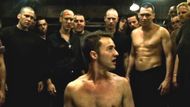David Fincher's Fight Club (1999), adapted from Chuck Palahniuk's novel, is not just a cult classic—it's a punch to the late-90s consumer culture. It revolves around a nameless Narrator (Edward Norton), a white-collar working stiff trapped in a Groundhog Day-esque loop of office drudgery, IKEA furnishings, and emotional numbness. Looking for something authentic, he begins fabricating illnesses in order to go to support groups, where he encounters Marla Singer, yet another emotional manipulator, who shakes his shaky reprieve.
Then Tyler Durden arrives.
Tyler (Brad Pitt) is the anarchy the Narrator never knew he required—a soap salesman with a philosophy, attitude, and utter disdain for mainstream culture. After the Narrator's apartment suddenly explodes, he moves in with Tyler, and the two begin Fight Club: an underground basement club where men beat one another in order to feel alive once more. It's ugly, aggressive, and strangely freeing. Fight Club gets big quick, attracting men who are burned out on modern life and are hungry for something—anything—real.
But Tyler doesn't leave it there.
Where bare-knuckle therapy began, Project Mayhem grows in a darker direction. This is no longer trading punches, but more chaos. It's a full-blown anti-capitalist uprising, a nameless force committing acts of domestic terrorism to destroy corporate hierarchies and eradicate debt. The Narrator, who was once caught up in the high of it all, begins to perceive the threat. Project Mayhem is not just revolution—it's fanaticism, and Tyler is no longer an ally. He's a danger.
That's when the actual twist comes: Tyler does not exist.
He's the Narrator's alter ego, a fractured personality created by years of repression and rage. Tyler is everything the Narrator secretly desires to be—daring, crazy, wild. The same guy who initiated Fight Club is now attempting to close it down.
With Project Mayhem ready to blow up credit card company HQs and restore the financial system, the Narrator battles to prevent it—literally fighting himself. Ultimately, he kills himself to symbolically murder Tyler, reunites with Marla, and sees the towers collapse. The screen goes black. Anarchy prevails—or perhaps freedom does.
Fight Club remains a belly-punch of a movie because it speaks to something universal: fear of being stuck in a life that appears to be perfect on the surface but is actually empty within. It captures the anger festering just below the surface of contemporary life and says: What happens if you burn everything? Project Mayhem is the response—and the warning. It's what occurs when rebellion loses its purpose and becomes what it initially set out against.
Project Mayhem and Fight Club
From fists to firebombs

So this is how it is: Fight Club begins with dudes beating the crap out of each other in parking lots, in the basement to feel alive. But along the way, that sloppy, unkempt therapy session turns into something a whole lot more organized—and a whole lot riskier. That something is Project Mayhem.
Consider it the big, bad evolution of Fight Club. What was originally personal catharsis becomes disciplined anarchy. Tyler Durden evolves from subterranean guru to full-fledged revolutionist, taking his army of battered misfits and morphing them into a militant group with a purpose: destroy the phony world and rebuild. Literally.
Project Mayhem is a boot camp for anarchy. There are bylaws (many of them), hierarchies, and ceremonies. Individuality? Fuhgeddaboudit. They shave their heads, wear identical attire, and abandon their names. They're referred to as "space monkeys"–disposable, compliant, nameless. Welcome to the anti-corporate cult that reflects... corporate culture!
The gospel according to Tyler

Tyler isn't punching, he's preaching. His manifesto is a blend of Nietzsche, Zen Buddhism, and punk-rock nihilism. Shed your crap, drop your ego, unlearn what society taught you to desire, and burn it all. His sermon goes something like this:
“You are not your job, you're not how much money you have in the bank. You are not the car you drive. You're not the contents of your wallet. You are not your f*****g khakis. You are all singing, all dancing crap of the world.”
And the deeper cut:
“It's only after we've lost everything that we're free to do anything.”
He’s not just rejecting consumerism—he’s declaring war on it. The credit card buildings, debt records– all gone. In Tyler’s mind, this is liberation by demolition.
Nonconformity that looks… a lot like conformity

Here's the plot twist within the plot twist: Project Mayhem, despite all its anti-establishment fury, turns out to resemble quite a bit the system it rails against.
Yes, the group claims its freedom. But what freedom requires shaved heads, silence, and complete obedience? Members aren't allowed to speak up unless they are spoken to; they chant mantras, obey commands, and worship a leader whom they don't question.
Does this sound familiar? It's a corporate organization in an anarchist t-shirt.
Tyler replaces one rigid ideology with another, and most of the space monkeys don’t even notice. It’s Fight Club’s biggest irony: to reject the system, they build a new one that’s just as controlling.
The masculinity meltdown

Zoom out a bit, and you’ll see Fight Club tapping into a full-blown identity crisis—specifically, the male kind.
By the late '90s, American men were gazing into cubicles, therapy jargon, soy lattes, and self-help tomes. The classic concept of manhood was ancient. Irrelevant. Clipped. And so, along comes Fight Club—a film (and novel) that knocks that angst in the face and yells: Wake up!
Project Mayhem is the final overcorrection. It vows to restore power to men by violence, discipline, and devotion to the cause. But at a high price: individuality, morality, and, of course, sanity.
From acts of defiance to domestic terror

Project Mayhem's early shenanigans are more prank than menace—graffiti, corporate vandalism, dead birds on car windshields. But things quickly heat up.
We’re talking blown-up coffee shops, destroyed art, chemical burns, and, eventually, the plan to level skyscrapers to wipe out financial records.
Tyler refers to it as "resetting the system." But it's also endangering lives for the sake of an ideology that's unraveling by the second. Fans and critics have been struggling with the film's dance around radical violence—does it glamorize it or caution against it? The answer is ambiguous, intentionally.
The evolution from Fight Club to Project Mayhem is one from anarchic freedom to totalitarian control. The initial battles are disheveled, untidy, and intimate. But Project Mayhem is razor-edged and militant. Tyler's hold grows strong. His disciples lose their names, their voices, and their intention. Suddenly, the man shouting "You're not a beautiful or unique snowflake" is creating a world where no one is.
And that's the brilliance of it.
Fight Club questions: What if your rebellion becomes your prison? What if the thing that was going to wake you up ends up brainwashing you?
Same uniform, different oppressor

Now, let's discuss the ultimate irony. Project Mayhem is founded upon the rebellion against conformity, but it becomes a factory of sameness. Everyone wears the same uniform. Everyone talks the same (or doesn't talk at all). No one ever dares to question anything.
It's as if Tyler constructed a bizarro version of the office gigs everyone wanted to flee. Just replace the suits with black hoodies and PowerPoint with pipe bombs. This is not freedom—it's fascism with better lighting.
As Einzelgänger so eloquently stated,
"We could say that by rejecting one doctrine in order to be ‘non-conformist’, we often imprison ourselves in another one."
For all the horror of it, Project Mayhem provides something that most of these men haven't experienced in a long time—meaning.
There's a ritual. Brotherhood. Risk. In a sterile, meaning-deprived society, even pain begins to pass as purpose. Shaved heads and acid kisses are marks of authenticity. And Tyler's grotesque form of existentialism—"Face death, find truth"—catches on.
Tyler Durden: Messiah complex in a leather jacket

Tyler is not only the creator—he's the prophet. He doesn't just command Project Mayhem—he is Project Mayhem. Each rule, each concept, each bomb originates from him. He's hip, quotable, revolutionary—and inhuman.
Charismatic figures such as Tyler entice with insurrection but ultimately require conformity. What begins as empowerment devolves into authoritarianism. And the worst part is that it succeeds. His minions don't challenge him—they idolize him.
Ultimately, Tyler becomes exactly what he intended to annihilate: an icon of control disguised as freedom.
However, Fight Club never tells you what to think. That's the entire point. Is Project Mayhem a scathing critique of consumer culture? Sure. Is it also a warning about cults, violence, and substituting one identity trap for another? Absolutely.
The genius of it is in the tension. It hooks you with revolution and then yanks the rug away. It has you rooting for the revolution, then leaves you wondering at what price. Fight Club doesn't give you answers—it challenges you to grapple with the contradictions.
And Project Mayhem? It's not a make-believe organization—it's an allegory for all the times we give up freedom for reality, or confuse destruction with significance.
Love movies? Try our Box Office Game and Movie Grid Game to test your film knowledge and have some fun!
